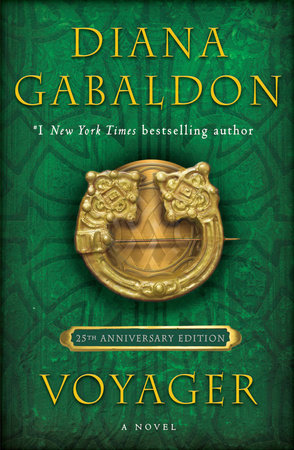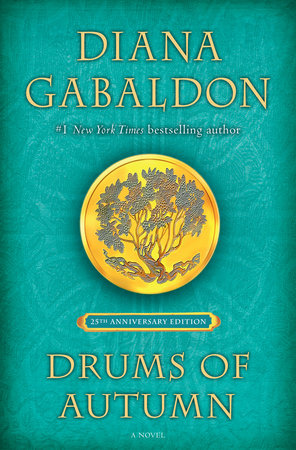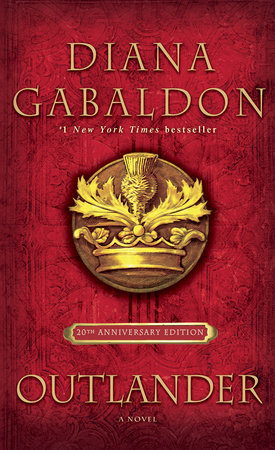Excerpt
Voyager (25th Anniversary Edition)
Chapter 1
The Corbies' Feast
April 16, 1746
He was dead. However, his nose throbbed painfully, which he thought odd in the circumstances. While he placed considerable trust in the understanding and mercy of his Creator, he harbored that residue of elemental guilt that made all men fear the chance of hell. Still, all he had ever heard of hell made him think it unlikely that the torments reserved for its luckless inhabitants could be restricted to a sore nose.
On the other hand, this couldn’t be heaven, on several counts. For one, he didn’t deserve it. For another, it didn’t look it. And for a third, he doubted that the rewards of the blessed included a broken nose, any more than those of the damned.
While he had always thought of Purgatory as a gray sort of place, the faint reddish light that hid everything around him seemed suitable. His mind was clearing a bit, and his power to reason was coming back, if slowly. Someone, he thought rather crossly, ought to see him and tell him just what the sentence was, until he should have suffered enough to be purified, and at last to enter the Kingdom of God. Whether he was expecting a demon or an angel was uncertain. He had no idea of the staffing requirements of Purgatory; it wasn’t a matter the dominie had addressed in his schooldays.
While waiting, he began to take stock of whatever other torments he might be required to endure. There were numerous cuts, gashes, and bruises here and there, and he was fairly sure he’d broken the fourth finger of his right hand again—difficult to protect it, the way it stuck out so stiff, with the joint frozen. None of that was too bad, though. What else?
Claire. The name knifed across his heart with a pain that was more racking than anything his body had ever been called on to withstand.
If he had had an actual body anymore, he was sure it would have doubled up in agony. He had known it would be like this, when he sent her back to the stone circle. Spiritual anguish could be taken as a standard condition in Purgatory, and he had expected all along that the pain of separation would be his chief punishment—sufficient, he thought, to atone for anything he’d ever done: murder and betrayal included.
He did not know whether persons in Purgatory were allowed to pray or not, but tried anyway. Lord, he prayed, that she may be safe. She and the child. He was sure she would have made it to the circle itself; only two months gone with child, she was still light and fleet of foot—and the most stubbornly determined woman he had ever met. But whether she had managed the dangerous transition back to the place from which she had come— sliding precariously through whatever mysterious layers lay between then and now, powerless in the grip of the rock—that he could never know, and the thought of it was enough to make him forget even the throbbing in his nose.
He resumed his interrupted inventory of bodily ills, and became inordinately distressed at the discovery that his left leg appeared to be missing. Sensation stopped at the hip, with a sort of pins-and-needles tingling at the joint. Presumably he would get it back in due time, either when he finally arrived in Heaven, or at the least, at Judgment Day. And after all, his brother-in-law Ian managed very well on the wooden peg he wore to replace his missing leg.
Still, his vanity was troubled. Ah, that must be it; a punishment meant to cure him of the sin of vanity. He mentally set his teeth, determined to accept whatever came to him with fortitude, and such humility as he could manage. Still, he couldn’t help reaching an exploratory hand (or whatever he was using for a hand) tentatively downward, to see just where the limb now ended.
The hand struck something hard, and the fingers tangled in wet, snarled hair. He sat up abruptly, and with some effort, cracked the layer of dried blood that had sealed his eyelids shut. Memory flooded back, and he groaned aloud. He had been mistaken. This was hell. But James Fraser was unfortunately not dead, after all.
The body of a man lay across his own. Its dead weight crushed his left leg, explaining the absence of feeling. The head, heavy as a spent cannonball, pressed facedown into his abdomen, the damp-matted hair a dark spill on the wet linen of his shirt. He jerked upward in sudden panic; the head rolled sideways into his lap and a half-open eye stared sightlessly up behind the sheltering strands of hair.
It was Jack Randall, his fine red captain’s coat so dark with the wet it looked almost black. Jamie made a fumbling effort to push the body away, but found himself amazingly weak; his hand splayed feebly against Randall’s shoulder, and the elbow of his other arm buckled suddenly as he tried to support himself. He found himself lying once more flat on his back, the sleeting sky pale gray and whirling dizzily overhead. Jack Randall’s head moved obscenely up and down on his stomach with each gasping breath.
He pressed his hands flat against the boggy ground—the water rose up cold through his fingers and soaked the back of his shirt—and wriggled sideways. Some warmth was trapped between them; as the limp dead weight slid slowly free, the freezing rain struck his newly exposed flesh with a shock like a blow, and he shivered violently with sudden chill.
As he squirmed on the ground, struggling with the crumpled, mudstained folds of his plaid, he could hear sounds above the keening of the April wind; far-off shouts and a moaning and wailing, like the calling of ghosts in the wind. And overall, the raucous calling of crows. Dozens of crows, from the sound.
That was strange, he thought dimly. Birds shouldn’t fly in a storm like this. A final heave freed the plaid from under him, and he fumbled it over his body. As he reached to cover his legs, he saw that his kilt and left leg were soaked with blood. The sight didn’t distress him; it seemed only vaguely interesting, the dark red smears a contrast to the grayish green of the moor plants around him. The echoes of battle faded from his ears, and he left Culloden Field to the calling of the crows.
He was wakened much later by the calling of his name.
“Fraser! Jamie Fraser! Are ye here?”
No, he thought groggily. I’m not. Wherever he had been while unconscious, it was a better place than this. He lay in a small declivity, half-filled with water. The sleeting rain had stopped, but the wind hadn’t; it whined over the moor, piercing and chilling. The sky had darkened nearly to black; it must be near evening, then.
“I saw him go down here, I tell ye. Right near a big clump of gorse.” The voice was at a distance, fading as it argued with someone.
There was a rustle near his ear, and he turned his head to see the crow. It stood on the grass a foot away, a blotch of wind-ruffled black feathers, regarding him with a bead-bright eye. Deciding that he posed no threat, it swiveled its neck with casual ease and jabbed its thick sharp bill into Jack Randall’s eye.
Jamie jerked up with a cry of revulsion and a flurry of movement that sent the crow flapping off, squawking with alarm.
“Ay! Over there!”
There was a squelching through boggy ground, and a face before him, and the welcome feel of a hand on his shoulder.
“He’s alive! Come on, MacDonald! D’ye lend a hand here; he’ll no be walkin’ on his own.” There were four of them, and with a good deal of effort, they got him up, arms draped helpless about the shoulders of Ewan Cameron and Iain MacKinnon.
He wanted to tell them to leave him; his purpose had returned to him with the waking, and he remembered that he had meant to die. But the sweetness of their company was too much to resist. The rest had restored the feeling in his dead leg, and he knew the seriousness of the wound. He would die soon in any case; thank God that it need not be alone, in the dark.
“Water?” The edge of the cup pressed against his lip, and he roused himself long enough to drink, careful not to spill it. A hand pressed briefly against his forehead and dropped away without comment.
He was burning; he could feel the flames behind his eyes when he closed them. His lips were cracked and sore from the heat, but it was better than the chills that came at intervals. At least when he was fevered, he could lie still; the shaking of the chills woke the sleeping demons in his leg.
Murtagh. He had a terrible feeling about his godfather, but no memory to give it shape. Murtagh was dead; he knew that must be it, but didn’t know why or how he knew. A good half of the Highland army was dead, slaughtered on the moor—so much he had gathered from the talk of the men in the farmhouse, but he had no memory of the battle himself.
He had fought with armies before, and knew such loss of memory was not uncommon in soldiers; he had seen it, though never before suffered it himself. He knew the memories would come back, and hoped he would be dead before they did. He shifted at the thought, and the movement sent a jolt of white-hot pain through his leg that made him groan.
“All right, Jamie?” Ewan rose on one elbow next to him, worried face wan in the dawning light. A bloodstained bandage circled his head, and there were rusty stains on his collar, from the scalp wound left by a bullet’s graze.
“Aye, I’ll do.” He reached up a hand and touched Ewan’s shoulder in gratitude. Ewan patted it, and lay back down.
The crows were back. Black as night themselves, they had gone to roost with the darkness, but with the dawn they were back—birds of war, the corbies had come to feast on the flesh of the fallen. It could as well be his own eyes the cruel beaks picked out, he thought. He could feel the shape of his eyeballs beneath his lids, round and hot, tasty bits of jelly rolling restless to and fro, looking vainly for oblivion, while the rising sun turned his lids a dark and bloody red.
Four of the men were gathered near the single window of the farmhouse, talking quietly together.
“Make a run for it?” one said, with a nod outside. “Christ, man, the best of us can barely stagger—and there’s six at least canna walk at all.”
“If ye can go, be going,” said a man from the floor. He grimaced toward his own leg, wrapped in the remains of a tattered quilt. “Dinna linger on our account.”
Duncan MacDonald turned from the window with a grim smile, shaking his head. The window’s light shone off the rough planes of his face, deepening the lines of fatigue.
“Nay, we’ll bide,” he said. “For one thing, the English are thick as lice on the ground; ye can see them swarm from the window. There’s no man would get away whole from Drumossie now.”
“Even those that fled the field yesterday will no get far,” MacKinnon put in softly. “Did ye no hear the English troops passing in the night at the quick-march? D’ye think it will be hard for them to hunt down our ragtag lot?”
There was no response to this; all of them knew the answer too well. Many of the Highlanders had been barely able to stand on the field before the battle, weakened as they were by cold, fatigue, and hunger.
Jamie turned his face to the wall, praying that his men had started early enough. Lallybroch was remote; if they could get far enough from Culloden, it was unlikely they would be caught. And yet Claire had told him that Cumberland’s troops would ravage the Highlands, ranging far afield in their thirst for revenge.
The thought of her this time caused only a wave of terrible longing. God, to have her here, to lay her hands on him, to tend his wounds and cradle his head in her lap. But she was gone—gone away two hundred years from him —and thank the Lord that she was! Tears trickled slowly from under his closed lids, and he rolled painfully onto his side, to hide them from the others.
Lord, that she might be safe, he prayed. She and the child.
Toward midafternoon, the smell of burning came suddenly on the air, wafting through the glassless window. It was thicker than the smell of blackpowder smoke, pungent, with an underlying odor that was faintly horrible in its reminiscent smell of roasting meat.
“They are burning the dead,” said MacDonald. He had scarcely moved from his seat by the window in all the time they had been in the cottage. He looked like a death’s-head himself, hair coal-black and matted with dirt, scraped back from a face in which every bone showed.
Here and there, a small, flat crack sounded on the moor. Gunshots. The coups de grace, administered by those English officers with a sense of compassion, before a tartan-clad wretch should be stacked on the pyre with his luckier fellows. When Jamie looked up, Duncan MacDonald still sat by the window, but his eyes were closed.
Next to him, Ewan Cameron crossed himself. “May we find as much mercy,” he whispered.
They did. It was just past noon on the second day when booted feet at last approached the farmhouse, and the door swung open on silent leather hinges.
“Christ.” It was a muttered exclamation at the sight within the farmhouse. The draft from the door stirred the fetid air over grimed, bedraggled, bloodstained bodies that lay or sat huddled on the packed-dirt floor.
There had been no discussion of the possibility of armed resistance; they had no heart and there was no point. The Jacobites simply sat, waiting the pleasure of their visitor.
He was a major, all fresh and new in an uncreased uniform, with polished boots. After a moment’s hesitation to survey the inhabitants, he stepped inside, his lieutenant close behind.
“I am Lord Melton,” he said, glancing around as though seeking the leader of these men, to whom his remarks might most properly be addressed.
Duncan MacDonald, after a glance of his own, stood slowly, and inclined his head. “Duncan MacDonald, of Glen Richie,” he said. “And others”—he waved a hand—“late of the forces of His Majesty, King James.”
“So I surmised,” the Englishman said dryly. He was young, in his early thirties, but he carried himself with a seasoned soldier’s confidence. He looked deliberately from man to man, then reached into his coat and produced a folded sheet of paper.







